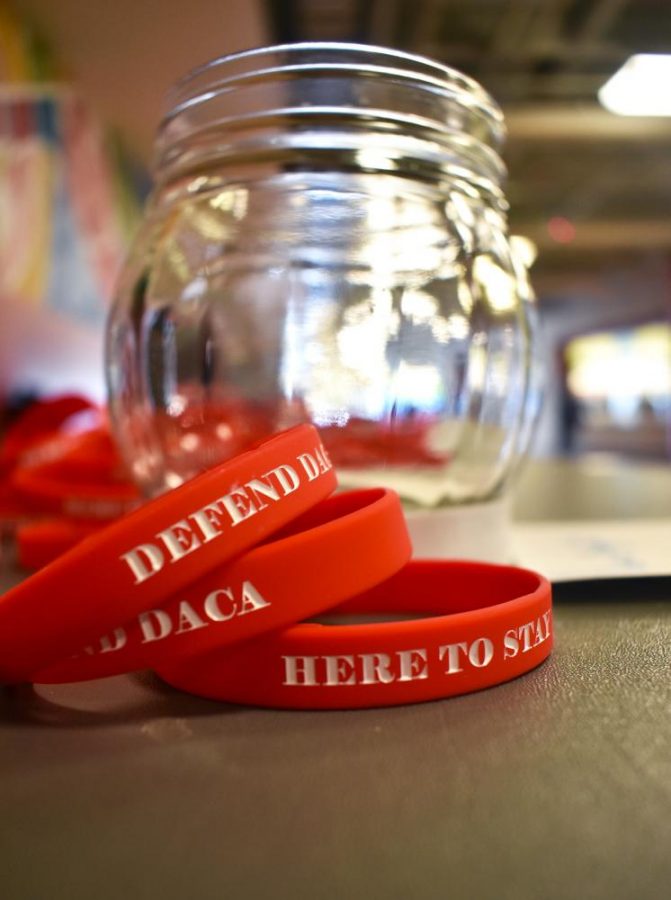WSU students react to US Supreme Court’s DACA ruling
Program has been frozen since 2017; Undocumented Initiatives at WSU provides workshops for applicants
KEISHA BROKAW | DAILY EVERGREEN FILE
The U.S. Supreme Court ruled to block termination of DACA on June 18. The Trump administration halted the program in 2017.
June 28, 2020
Linda Vargas was shocked by the texts she saw on her phone when she woke up on June 18.
“My friend … she messaged me, ‘They blocked it,’” Vargas said. “I couldn’t believe it.”
Vargas, senior environmental sciences major, said she did not expect the Supreme Court to block the repeal of the Deferred Action for Childhood Arrivals program.
“There was an immediate feeling of relief, because for so long we have been thinking it wasn’t going to be approved,” Vargas said.
Mayra, sophomore elementary education major, said she cried with happiness when she heard the news because two of her brothers are DACA recipients, though she is not. Mayra requested her last name not be used for personal safety concerns.
DACA, which began in 2012 under the Obama administration, is a program that allows children of undocumented immigrants to apply for a temporary two-year deferral of deportation, which also provides work authorization. It was rescinded in 2017, according to the Supreme Court ruling.
The program has been frozen since 2017 and new applications have not been accepted, Vargas said.
The Supreme Court’s June 18 ruling means the United States Citizenship and Immigration Services should temporarily accept renewal applications from current DACA recipients, as well as new applications, Vargas said.
“We were first just very happy that our friends who do have DACA … that they’re staying a little while,” Mayra said. “It’s just even better that hopefully, we can apply as well.”
Though helpful, the ruling is not a permanent fix for the undocumented community, Vargas said.
“At the end of the day, it was a technical win for the undocumented community and for DACA students,” Vargas said, “but the reality is that the program only gives temporary protection as the Trump administration attempts to … get rid of [it].”
The Trump administration’s reasoning for the rescission of DACA in 2017 was “arbitrary and capricious” under the Administrative Procedures Act, according to the ruling. This means the administration has a chance to provide new reasoning for the program to be repealed.
Many undocumented students who did not qualify for the program before it was frozen struggled to sustain themselves because they did not have work authorization, Vargas said.
“I think it’s about time that we figured out what to do with DACA,” she said. “These students are suffering because there is so much uncertainty in our lives.”
Students who do have DACA struggle with talking about mental health, worrying about their family being deported while they are at college and what they will do with their degrees if they lose work authorization, Vargas said.
“We’re just trying to get degrees, we’re not bad people,” Mayra said. “We’re on the same team.”
Vargas, who is the ambassador for Undocumented Initiatives and a DACA recipient, said Undocumented Initiatives at WSU is providing workshops for students to help them apply for DACA while it is still possible.
“It’s physically a race against time,” Vargas said. “We’re trying to make sure we help as many students as possible so that they don’t lose the opportunity, once again, to submit their DACA applications.”
Mayra and Vargas both said the resources and support for undocumented students from Undocumented Initiatives and other on-campus groups influenced their decision to attend WSU.
There is currently no path to citizenship through DACA, Mayra said. People who have it only receive temporary protection from deportation.
“I am happy,” Mayra said, “but the fight is not over.”










